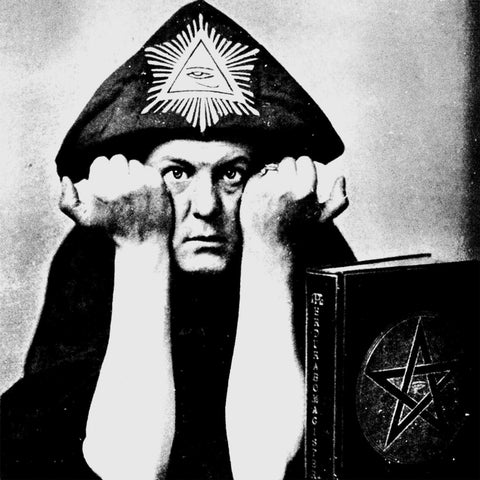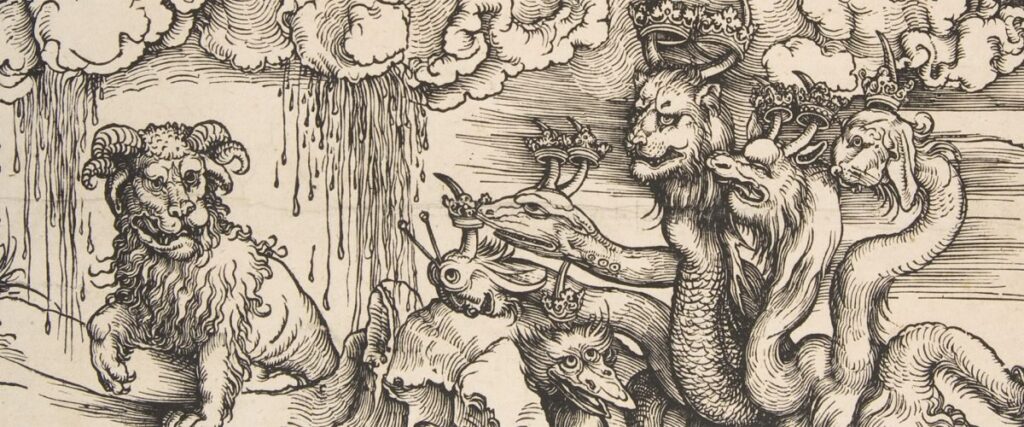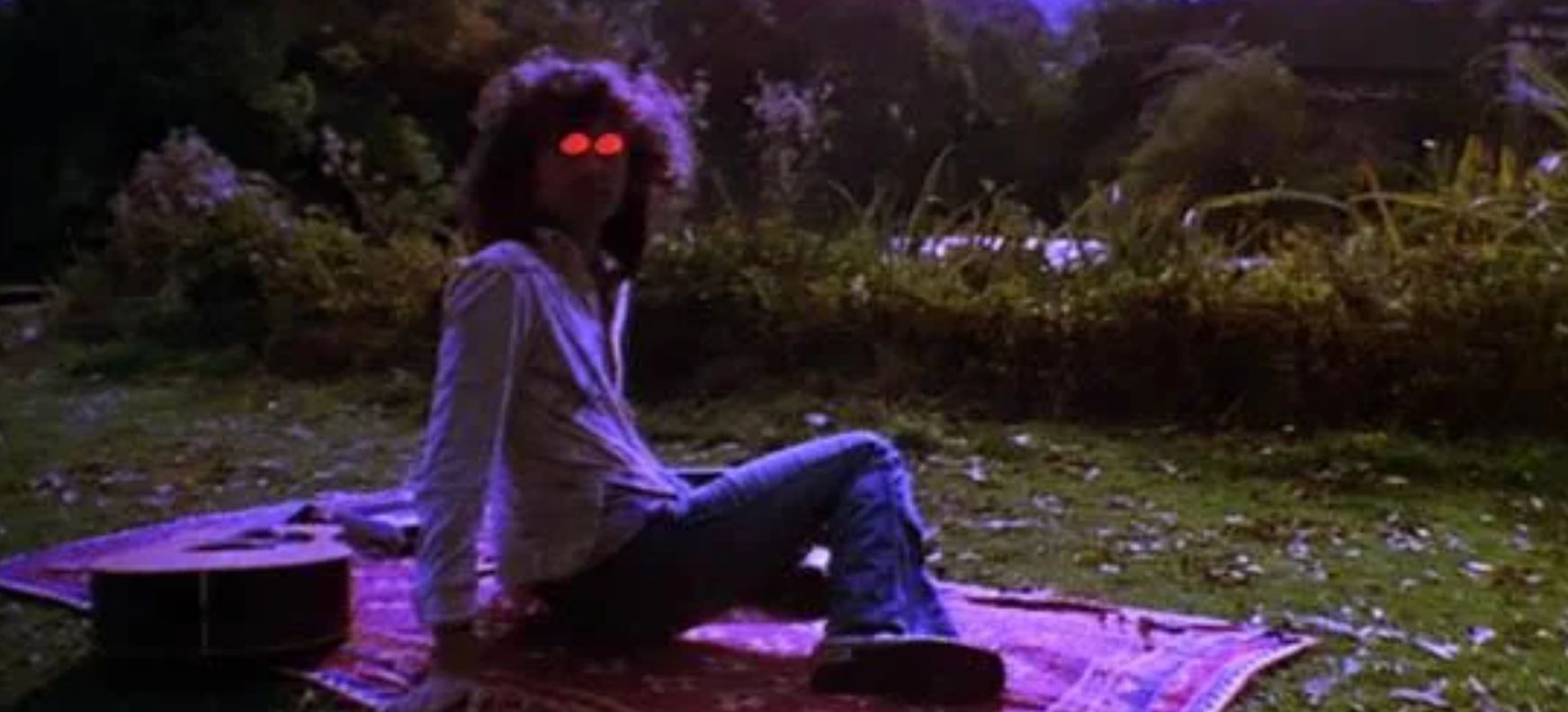It’s a question that could only be borne out of some paranoid evangelical fever dream. Which it partly was.
I graduated high school in 1976. The 60’s counter-culture movement was winding down. I’d taken my share of LSD and exhausted the little monies I had on rock concerts and vinyl albums. So by the decade’s end, I was burned out, existentially lost, and in great need of a spiritual do-over. Which I got. In the Spring of 1980 I would become a Christian. It was a radical conversion, part of which involved a closer look at the music I was steeped in and the darker forces behind it.

Aleister Crowley
Learning that Jimmy Page, lead guitarist for Led Zeppelin, had an avid interest in the occult arts, even purchasing Aleister Crowley’s mansion (Crowley was a renowned occultist, the self-proclaimed Beast of the Book of Revelation, labeled the “Wickedest Man in the World”), was just the tip of a conspiratorial iceberg. It didn’t take much to discover that dark esoterica permeated the music I enjoyed. The Beatles traveled to India (and elsewhere) learning Transcendental Meditation from Maharishi Mahesh Yogi. The boys from Liverpool quickly went from singing “I Wanna Hold Your Hand” to “I am the Walrus.” Meanwhile, the Rolling Stones had their own “demonic phase,” which included Mick Jagger’s “fascination with Satanic and Luciferian imagery.” Shortly before bandmate Brian Jones’ mysterious death, he’d explored incorporating indigenous “trance music” into the band’s sound. Similarly, Jim Morrison considered himself a shaman, an intermediary between his musical tribe and the pagan gods. The Moody Blues invited us to join Timothy Learys’ adventures along his “astral plane,” and even wrote a song commemorating a sacred Hindu syllable. And Yes’ double album, “Tales of Topographical Oceans” is based on four Shastric scriptures found in a footnote in “Autobiography of a Yogi” by Paramahansa Yogananda.
At one time, I would have scoffed at the intersection of the occult and rock music. But being that my quest for “enlightenment” had left me burnt out and broken, and the claims of Christ were suddenly making sense, the idea that other “forces” were toying with me only inflamed my growing paranoia.

The Hurdy Gurdy Man by Donovan
Donovan’s song “Hurdy Gurdy Man” was an interesting addition to this growing conspiratorial playlist. Written and recorded in 1968, the lyrics follow thus:
Thrown like a star in my vast sleep
I open my eyes to take a peep
To find that I was by the sea
Gazing with tranquility.
Chorus: ‘Twas then when the Hurdy Gurdy Man
Came singing songs of love,
Then when the Hurdy Gurdy Man
Came singing songs of love.
Hurdy gurdy, hurdy gurdy, hurdy gurdy, gurdy he sang…
Histories of ages past
Unenlightened shadows cast
Down through all eternity
The crying of humanity.
Chorus repeat

Donovan playing a tamubra
It’s an odd song, for many reasons. For one, the music. The song melds distorted fuzz guitar with Eastern influences, namely a tambura, which was a gift from George Harrison to Donovan. With the vibrato verbal effect, the song has a dreamy, yet unnerving quality (which is likely why it fits so well in David Fincher’s film about the serial killer, “Zodiac”). Not coincidentally, Donovan wrote the song as a result of his visit to India and the Maharishi. (The yogi’s influence among counter-cultural influencers is considered to be one of the primary vehicles for the import of Hinduism into the West.)
Secondly, and perhaps more relevant to this article, is the attachment of Jimmy Page to the project. Though questions have arisen about Page’s actual involvement in the song, on his website, he lists Hurdy Gurdy Man in his credits. Page’s interest in the occult only heightened my interest in his affiliation with Donovan and contribution to the song. Indeed, this took an intriguing turn when Page appeared in a fantasy sequence in his band’s 1976 film release, “The Song Remains the Same,” playing a hurdy gurdy box. (The hurdy-gurdy is a stringed instrument that produces sound by a hand-turned crank, rosined wheel rubbing against the strings.) In the film, as Page turns to the camera, his eyes glow an eerie red.
While Donovan’s lyrics are not about a hurdy gurdy box, the song appeared layered with a symbolism that invoked some understandably disturbing interpretations. Remember, at the time, a spiritual veil was being ripped from my face. I was coming to the Scriptures with open eyes. Both God and Satan seemed to be popping up everywhere. Thus, it was conjectured by some in my circle of psychonauts, that the Hurdy Gurdy Man was about the Antichrist. At the time, that interpretation was hardly a stretch.
In the Book of Revelation, the Beast, or the antichrist, rises out of the sea.
Then I stood on the sand of the sea. And I saw a beast rising up out of the sea (Rev. 13:1 NKJV)
In Scripture, the sea is often used metaphorically of chaos and danger. But it is also used of nations and the throngs of wicked. The prophet Isaiah said,
But the wicked are like the troubled sea, When it cannot rest, Whose waters cast up mire and dirt. (Is. 57:20 NKJV)
Elsewhere in his book, he proclaimed,
Woe to the many nations that rage— they rage like the raging sea! Woe to the peoples who roar— they roar like the roaring of great waters! (Is. 17:12 NIV)
Also, in the book of Revelation, an angel describes John’s vision of a sea as pertaining to the Gentile nations. “Then the angel said to me, ‘The waters you saw… are peoples, multitudes, nations and languages” (Rev 17:15 NIV).
In Donovan’s song, the Hurdy Gurdy Man arrives via the sea. The artist, mid-sleep, awakens “by the sea.” But it’s a troubled sea. In fact, the following verse tells us more about the spiritual climate preceding the arrival of this strange figure.
“Histories of ages past
Unenlightened shadows cast
Down through all eternity
The crying of humanity.‘Twas then when the Hurdy Gurdy Man comes singing songs of love…”
So this oddly messianic-type figure arrives during a time when “unenlightened shadows” are being cast and the “crying of humanity” is echoing “down through all eternity.” This is the hour in which the Hurdy Gurdy Man arrives “singing songs of love.”
 Detail from “The Beast with the Seven Heads and the Beast with Lamb’s Horns,” 1511, Albrecht Dürer
Detail from “The Beast with the Seven Heads and the Beast with Lamb’s Horns,” 1511, Albrecht Dürer
The scenario rather strikingly parallels the biblical account of the Antichrist. For not only would the Beast rise out of the troubled sea of humanity — in many eschatological constructs, he is revealed during the Great Tribulation — but he arrives “singing songs of love.” In fact, the Antichrist is sometimes called “the Man of Peace” because he will bring a false peace to the troubled world. Some see Daniel 9:27 as teaching that the Antichrist will make a peace covenant with warring (Middle Eastern) factions, thus deceiving many. In fact, concerning the end of this present age, the Apostle Paul cautioned the Thessalonian believers, “For when they shall say, Peace and safety; then sudden destruction cometh upon them, as travail upon a woman with child; and they shall not escape” (I Thess. 5:3 NIV). Thus, the Beast will proclaim “Peace, peace,” when there is no peace.
Furthermore, the Antichrist has an accomplice. The Bible calls him “the Dragon.” The world “worshipped the dragon which gave power unto the beast” (Rev. 13:4 KJV). Scholars interpret the dragon variously. His inclusion here is only mentioned because the Hurdy Gurdy Man has a similar accomplice. He is “the Roly Poly Man.” While Donovan mentions the Roly Poly Man fleetingly, the mysterious figure clearly appears to help the Hurdy Gurdy Man convey his message. His mention only fueled our speculation about the Hurdy Gurdy Man’s archetypical object.
Unlike many of the songs and musicians I’d encountered who’d openly professed esoteric dabblings, Eastern religion was the only “occult” element blatantly attached to the Hurdy Gurdy Man. In an interview with Donovan in 1988, he elaborated on the meaning of the song:
…I know I am the Hurdy Gurdy Man. But also the Hurdy Gurdy Man is all singers who sing songs of love. The hurdy-gurdy is an instrument from the sixteenth century. The Hurdy Gurdy Man is a chronicler. The Hurdy Gurdy Man is like a bard. The Hurdy Gurdy Man is any singer-songwriter in any age, whether they were Ireland of whether they were in the streets of New York during the 60s.
Songwriters tend to look for a world that will improve. The singing of songs for a better world can be seen in any age. Especially in the 20th century. So any singer for peace is a Hurdy Gurdy Man.
While Donovan’s explanation makes zero mention of the Antichrist, the song’s theme remains particularly telling. Bringing world peace has been an openly stated goal of many a musician, occultist, and political statesman. But what kind of peace are they offering? Like the Antichrist, they are offering a temporary peace, a vapid peace.
After years of sex, drugs, and rock ‘n roll, the end of the 1970’s left me burned-out, restless, and completely unfulfilled. The minstrels, like Donovan, who’d sung about love, eventually got divorced or died of overdose. Eastern religion told me that life was “maya,” an illusion. But the moral and existential walls I kept beating my head against seemed very real. And the more I considered Christ, the more the gurus and hurdy gurdy men just couldn’t stand up to Him.
So is Donovan’s Hurdy Gurdy Man about the Antichrist? Naw. But those “enlightened” souls who arrive “singing songs of love” may share his ambition. Like the antichrist, Eastern religion and occultism offer a false peace. Sadly, that “peace” is often packaged in a catchy little song.
















All of this was well before my time, but this was an interesting read. I didn’t know that this song was ever considered that way.